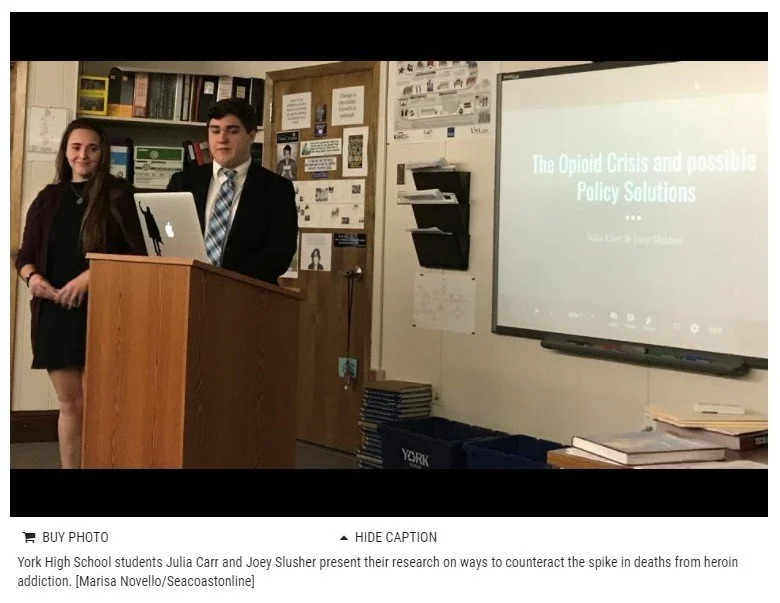YORK -- For York High School students of Advanced Political and Legal Studies, youth doesn’t limit the difference they are making in their community.
Teacher Jeff Barry had his 30 students split into multiple sections at the school last Thursday and Friday, and conduct 20 to 30 minute group presentations of their research for Project Citizen.
Barry’s Project Citizen is intended to promote civic participation through direct action. The students spent approximately 12 weeks working on their projects, beginning with identifying a concern or public policy issue in the local community. Students then had to research the issue, examine alternative solutions to the problem, propose their own solution, and engage in a civic action to address it. Barry says the public hearings are intended as a demonstration of students learning about the essential elements of effective citizenship and the public policy process.
“Significant research shows students who have an authentic experience are more likely to engage later in their lives,” Barry said.
In the Friday morning session, three groups presented.
Students Sophia Eytel, Sammi Pooler, Anya Walsh, and Margaret Wilkinson presented their initiative to ban the use of Styrofoam in York, starting with takeout containers from restaurants. They created a website, Yorkstyrofoamtakeoutordinance.com, to inform the public of their research on the negative health and environmental effects of Styrofoam use, and how that could impact the community of York, a town that relies on the seafood industry and beaches for tourism.
They also initiated a petition through Change.org, which has garnered over 1,600 online signatures of support, and reached out to members of the community from whom they gained a lot of feedback.
Walsh said people “looked at us more than we were just high school students.”
They researched other cities and towns who have banned Styrofoam, as well as the difference of cost for restaurateurs to switch to biodegradable paper containers.
They plan to carry out their initiative past the class semester. They are meeting with the Board of Selectmen in early March and hope the ordinance will be included on the November ballot.
Classmates Robyn Jutras, Kathryn Miller, and James Peter gave a presentation on the preservation of the York River. They also built a website, Preserveyorkriver.weebly.com, to help inform the community about the York River Study Committee, a community committee formed to develop a York River Watershed Management Plan and evaluate the suitability of a Partnership Wild and Scenic River. The students said the partnership allows for the potential for federal funding while retaining local control.
The students said they hoped to inform voters. Peter said it’s a rare beneficial opportunity for the community, as there are only 13 of these partnerships in the country.
Lastly, Julia Carr and Joey Slusher researched ways to counteract the spike in deaths from heroin addiction.
Through their research, they found Maine had a 40 percent increase of deaths from drug overdoses in 2016, and found 46 percent of federal inmates are in prison for drug charges.
″[It’s] obviously a very prevalent issue here in the Unites States but also here at home,” Slusher said of Maine. Both Carr and Slusher said they have been personally affected by this epidemic.
A solution they found most effective from their research was Vermont’s “hub and spoke” system, where opioid treatment programs are the hubs, and the spokes are the office-based physicians prescribing medicated assisted treatments such as buprenorphine. They explained this method is used to reverse the effects of addiction, and would also provide counseling and support for those battling addiction and integrating back to their daily lives.
Slusher said this model is something Maine is already considering, but it requires funding from the state.
Barry has conducted Project Citizen for what he estimates is 10 years. Though it has grown and changed over time, the results show progress within the community.
In past years, Project Citizen has resulted in the school’s water fountains being upgraded to allow students to refill their water bottles. These upgraded systems went into effect because students of Barry’s class were concerned about the impact of plastic bottles from the vending machine. Another student concerned with bicycle safety was responsible for the inclusion of bike lanes on a stretch of road near Village Elementary School.
Barry said an objective of his course is to demonstrate to students the power of an individual, even if they aren’t able to vote yet. He also hopes to empower students to serve the greater good, and to show them what it means to be part of a community.
Carr said the class taught her how to “figure out how we can help.” And Slusher said it showed him how to “make more and more people aware and gain more support” on passion projects.
Victoria Simon, a York resident and member of Bring Your Own Bag York, came to observe the Styrofoam presentation, a group who said they were inspired by the initiative to reduce plastic waste and ban plastic bags in York. Simon called the class amazing and said every student in the school and every school in the state should have this class.
“They think about real world problems and make real world changes,” said Simon.
